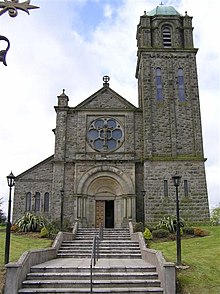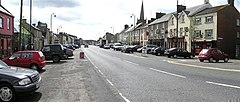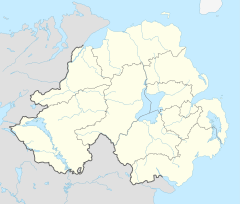|
Aughnacloy, County Tyrone
Aughnacloy, sometimes spelt Auchnacloy (Irish: Achadh na Cloiche, meaning 'field of the stone'[1]), is a village in County Tyrone, Northern Ireland. Close to the border with County Monaghan in the Republic of Ireland, the village is about 20 km southwest of Dungannon, and 7 km southeast of Ballygawley. It is situated in the historic barony of Dungannon Lower and the civil parish of Carnteel.[2] In the 2011 census it had a population of 1,045.[3] HistoryMuch of the town was built in the 18th Century by Acheson Moore, the local landlord. Because he backed the Jacobite cause, he planted his estate in the shape of a thistle and planned out the town on the edge of it.[4] Unable to rename it "Mooretown", he had to settle for naming the main street "Moore Street", and the side streets Sydney, Lettice, and Henrietta (now Ravella Road), after his three wives. The thistle is still visible from the air.[5] Aughnacloy served as an important staging post on the road to Derry.[6] However, lacking large-scale industry, it started to wane in the late 19th century.    The TroublesIn 1988, Aidan McAnespie, a Catholic civilian, was killed by a bullet from a general purpose machine-gun held by a British Army soldier at Aughnacloy. Twenty years later (June 2008), the PSNI Historical Enquiries Team published its findings on the case in a report. The report stated that the soldiers claim that his wet hands caused an accidental discharge was the "least likely version" of what happened.[7] Demographics2011 censusAt the time of the 2011 census (27 March 2011), Aughnacloy had a population of 1,045, accounting for 0.06% of the total NI population.[8] Of those 1,045 people:
TransportAughnacloy had its own railway station on the Clogher Valley Railway (CVR) from 2 May 1887 to 1 January 1942.[9] The CVR's headquarters and locomotive workshop was also at Aughnacloy. Current proposals to upgrade the A5 road through the village to a dual carriageway and build a bypass have met with a mixed reaction in the town, with many traders and farmers strongly opposed. [citation needed] The town is served by Bus Eireann Expressway Route 32, connecting the town to both Dublin and Letterkenny. Education
Sport
Notable peopleSee alsoReferences
SourcesWikimedia Commons has media related to Aughnacloy, County Tyrone.
|
||||||||||||||||||||||||||||||

